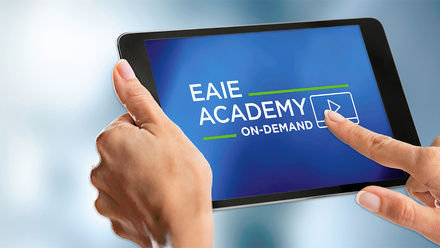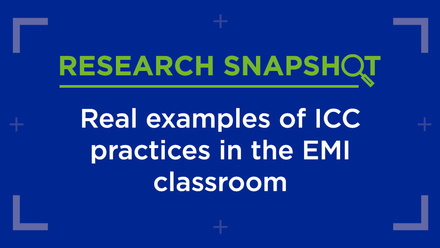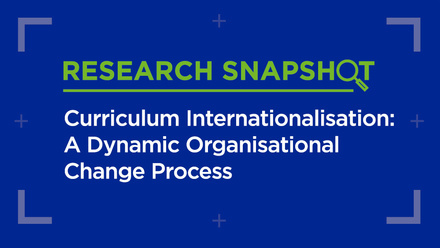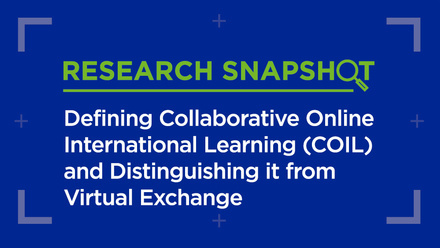Integrating internationalised learning outcomes

Integrating internationalisation in learning outcomes and assessment has long been known to be a key issue in higher education. However, getting buy-in from academics and incorporating learning outcomes into a programme’s larger internationalisation goals can present a challenge.
The European Parliament has been calling for "better defined internationalised learning outcomes" since the publication of its study ‘Internationalisation of higher education’ in 2015. However, learning outcomes – or, more correctly, intended learning outcomes – do not enjoy great popularity with academics. When academic performance is evaluated solely on the basis of research output, there is little incentive for academics to engage with learning outcomes, or indeed with teaching and learning. Academics may have ‘inherited’ learning outcomes from a predecessor, or outcomes may have been written by someone other than themselves. This can lead academics to not even look at the learning outcomes of the subjects they teach.
It is therefore hardly surprising that attitudes toward learning outcomes range from annoyed acceptance as a necessary part of accreditation, to viewing them as an outright threat to their academic freedom. This explains why the educational literature includes titles such as "Why is it so difficult to write learning outcomes?" One guide for writing learning outcomes even asks: "Why do some people hate learning outcomes?"
One source of such views is that many academics have not been prepared or trained to write and use learning outcomes. At many universities, this has not been considered a priority because others may be responsible for writing them, resulting in academics’ lack of a sense of ownership of ‘their’ learning outcomes. Additionally, they may not even find learning outcomes useful for planning their teaching and students’ learning. While teaching and learning centres and academic developers can provide assistance, academics have sometimes also resisted their suggestions.
Internationalising learning outcomes
These issues with learning outcomes come to a head when they need to be internationalised. What is the intended internationalisation of a particular programme of studies and how should this be reflected in the learning outcomes?
In some cases, an isolated international learning outcome is added on to the existing learning outcomes, instead of integrating the international dimension into the other learning outcomes. In other cases, the words "international" or "in an (inter)national context" are simply added, but they may constitute merely cosmetic changes. Even when academic developers are involved in the process of (re)writing learning outcomes, they often feel unable to offer more meaningful suggestions because they have not been involved in internationalisation.
Internationalised learning outcomes are considered the key indicators for the quality and consistency of internationalisation in a programme of study
These difficulties should not cause us to avoid addressing the internationalisation of learning outcomes. After all, internationalised learning outcomes ensure that international dimensions are really taught and assessed and not left to chance. For this reason, internationalised learning outcomes are considered the key indicators for the quality and consistency of internationalisation in a programme of study. It is precisely for this reason that the Certificate of Quality in Internationalisation (CeQuInt) has internationalised learning outcomes as its backbone.
Engaging academics
Working with academics on learning outcomes is time consuming, complicated and intensely academic. At the same time, it is highly rewarding.
Three years ago, we started action research with academics at Slovenian universities, aimed at identifying the relevant international dimensions of their study programmes and integrating these in learning outcomes. During this ongoing research, we have been surprised by how engaged academics were and how responsible they felt for teaching and learning. The action research led to some deep insights into the existing learning outcomes in syllabuses. Academics started to ask critical questions such as "What does this mean?", "Who wrote this in the first place?" and "Why should we teach this at all?" These are relevant questions, since syllabuses are guides for students and academics alike and should reflect the real situation of what is being taught within modules or subjects.
Academics started to ask critical questions such as "What does this mean?", "Who wrote this in the first place?" and "Why should we teach this at all?"
Action research with academics also revealed how language-sensitive articulation of learning outcomes is. To include an international and intercultural dimension in learning outcomes in a first language is already difficult enough, but finding the exact and meaningful phrasing in a second or third language (frequently English) adds another level of complexity. Still, even if the programme is delivered in the local language, it is important to have learning outcomes in English, in order to share these with international partners and other external parties.
At one point in the action research process, academics frequently remark that they feel they are doing more than internationalisation. Through this process, they find the opportunity to address fundamental aspects of their study programme and its integral quality. Many academics recognise that crafting learning outcomes is a highly academic and at the same time creative process.
Integrating internationalised learning outcomes
However, even when the learning outcomes of a particular module have been formulated correctly, there is still the question of how these align with the outcomes of other modules and with the outcomes of the study programme as a whole. Therefore, our action research with academics goes beyond their own subjects and courses but addresses the entire curriculum. This makes formulating outcomes at programme, module and session levels a complicated, in-depth and time-consuming process.
A final prominent aspect of action research with academics on learning is answering the question, "How do we assess these learning outcomes?" Can assessment be carried out in a way that leads to credible results and at the same time has a positive impact on quality?
Assessment is a very important (although frequently unpleasant and tiring) task for many academics. Yet, every good teacher is aware that students’ ‘fate’ largely depends on assessment. How to combine and compare content from different sources and different contexts? How to assess as fully as possible all the relevant components of (international) knowledge, skills and attitudes intended in learning outcomes? How to assess the practical implementation of relevant employability and employment skills? And finally, how to be a fair assessor?






